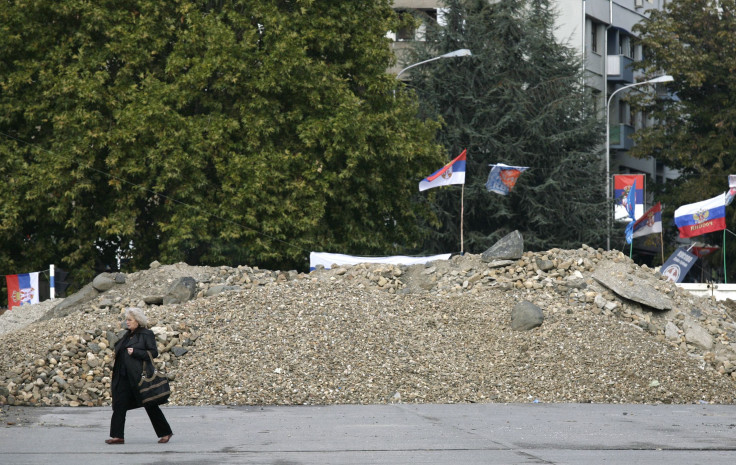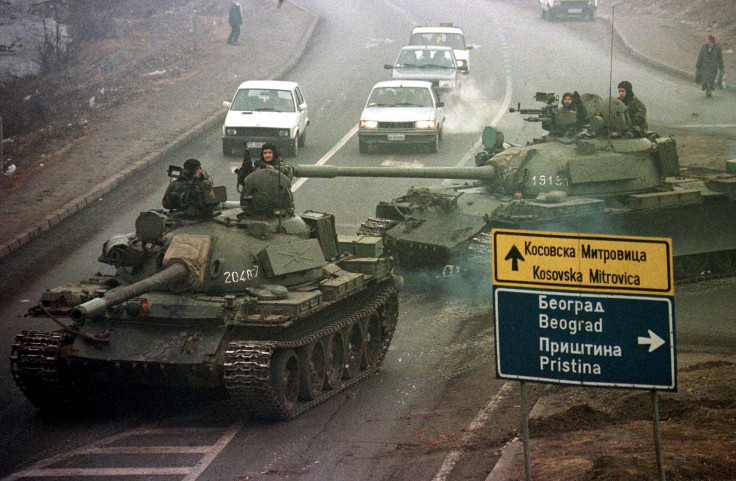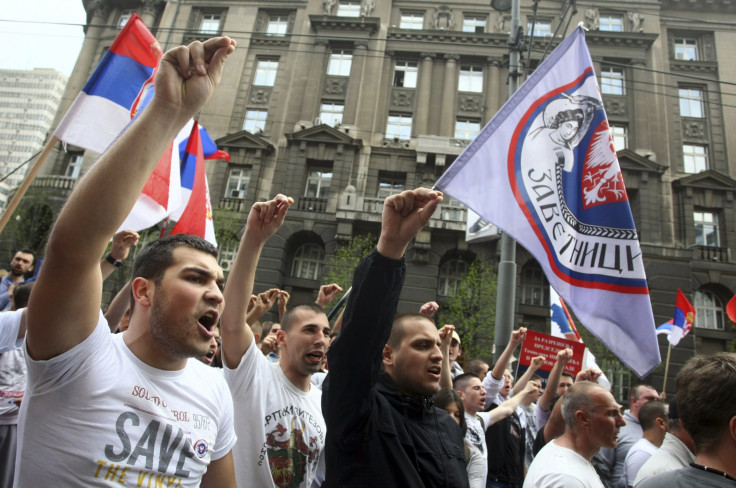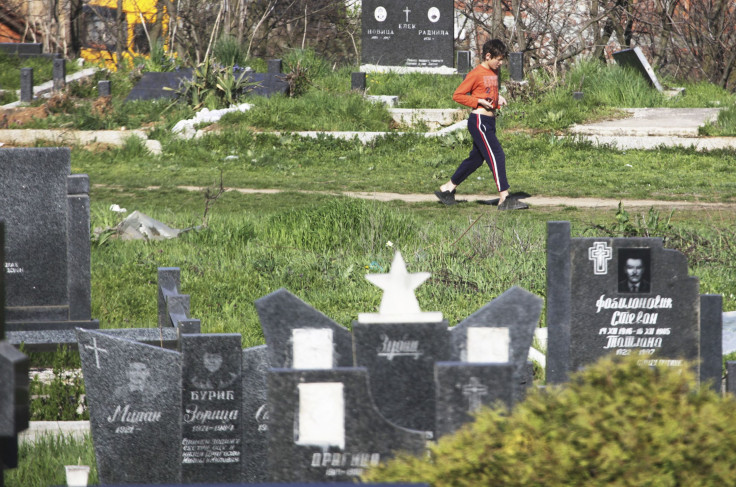For Serbia And Kosovo, Progress And A Pile Of Rocks: EU Agreement Brings Hope Of Reconciliation

At the north end of a steel bridge in the Kosovar town of Mitrovica, a massive mound of dirt stands as a testament to years of bad blood.
The bridge is a short one; it crosses the Ibar River, which is only a stone’s throw from bank to bank. The city south of the waterway is populated mainly by ethnic Albanians; the north is dominated by ethnic Serbs.
Fallout from a bloody conflict in 1999 drove northern residents to erect an earthen barrier on their side of the crossing, making it difficult for vehicles to pass through. It was an attempt to keep the Kosovo administrative center of Pristina, which is about 40 miles southeast, from extending its influence into that Serbian bastion of Kosovar territory.
Mitrovica is only the epicenter of a larger struggle between members of different ethnic groups across Kosovo. Kosovo autonomy is one of the most pressing and divisive issues in Serbia. Serbia is just one of several nations of former Yugoslavia that are struggling with the costs and benefits of accession to the European Union, and the EU’s absorption of still-outlying economies is a process fraught with ongoing problems. It's a morass of myriad conflicts, each subsumed within another like Russian nesting dolls.
On April 19, a preliminary deal was brokered that could mean the beginning of long-sought peace between Serbia and Kosovars. On Thursday, talk of a referendum to test that deal cast a shadow of doubt over the proceedings.
Clearly, last week’s agreement -- a momentous event and a coup for the EU -- is only a start. Old tensions are far from fading, as evinced by the old pile of rocks that still blocks the bridge at Mitrovica.
Pros, Cons and Kosovars
EU foreign affairs chief Catherine Ashton presided over talks that saw Serbian Prime Minister Ivica Dacic and Kosovo Prime Minister Hashim Thaci sign an agreement to normalize relations, bringing both entities closer to EU accession.
For Serbia, the advantages of the agreement are clear. The national economy shrank in 2012, hit by the double-whammy of recessions across the EU and a drought that cut agricultural output. Public debt grew to about 60 percent of GDP, and the unemployment hovered around 25 percent. This year is shaping up to be a better one, to the relief of officials in the capital city of Belgrade. EU membership -- or even progress toward that end -- would do even more to spur domestic reforms, ease international trade and raise investor confidence.
That’s not to say all Serbians approve of the measure, Daniel Serwer, who has worked on peacekeeping in the Balkans with the United States Institute of Peace and is now a professor at Johns Hopkins School of Advanced International Studies, said.
“Not everybody will be happy about the agreement,” he said. “But Serbia has lots of incentive to follow through ahead of their EU candidacy in June. EU monies and support of that candidacy will be very dependent on how well Serbia abides by the agreement. This continues even after June. The EU will have leverage over Serbia so long as it is a candidate, which may well be another decade.”

Serbian resistance hinges on disputes over territorial sovereignty. Kosovo was controlled and policed by ethnic Serbs when the territory was a part of Yugoslavia, and a Kosovar insurgency formed in response during the 1990s. The conflict culminated in the Kosovo War of 1998-99, which killed thousands on both sides and ended after NATO intervened with a bombing campaign against Serbian troops.
Kosovo gained some measure of de facto autonomy in the aftermath and unilaterally declared independence in 2008. The West has generally supported the territory’s ambitions, and today, Pristina is the administrative capital. But Belgrade has never recognized Kosovo’s sovereignty, and a UN decision on the matter has been stymied by division within the Security Council.
The issue is further complicated by Kosovo’s northern enclaves of ethnic Serbs, many of whom still harbor fierce animosity toward Kosovars just across the Ibar River.
That waterway is sometimes considered a boundary between ethnic groups, but in fact, the division is a hazy one. More than 40,000 ethnic Serbs in Kosovo, most of whom are Christian, live north of the waterway. But about twice that amount live south of the river, interspersed with communities where ethnic Albanians are prevalent and Islam is the major religion.
The Big Deal
The April 19 accord may help Serbia shore up its faltering economy, but it'll do even more to help Kosovo realize its goal of autonomy.
The text of the agreement is short and spare. It consists of 15 points and calls for the integration of Serbian and Kosovar political structures in the territory, the concession of overarching administrative control to Pristina, and an allowance for majority-Serb security forces to police four majority-Serb municipalities in the north.
The 14th point is by far the most significant: “It is agreed that neither side will block, or encourage others to block, the other side's progress in their respective EU path.”
An earlier version of that clause said that neither side would block accession to any international bodies, which would've included the UN. But Belgrade drew the line there; officials saw UN member status as too clear an indication of sovereignty, which Serbia was apparently not ready to relinquish.
Interesting, then, that the 14th point as it now stands would allow Kosovo access to EU membership. That would also signify a recognition of sovereignty.
“We all know that one of the conditions to becoming an EU member is to be a sovereign independent state,” Serwer, who testified in support of the agreement for U.S. Congress on Wednesday, said. “So this Point 14 essentially acknowledges that Kosovo is a sovereign state, and there’ll be no retreat from that. It doesn’t say outright Belgrade recognizes this, but it’s implicit.”
If Serbia abides by these rules, it can expect to begin EU accession talks in June.
The news has incensed hardline nationalist Serbs. Thousands of them gathered in Mitrovica on Monday to wave Serbian flags and accuse Belgrade of treason. Even the Serbian Orthodox Church weighed in, condemning the EU agreement and calling it a “clear surrender.”

The broader opinion among Serbs is far from one-sided. A poll conducted by the Ninamedia agency earlier this month -- two weeks before the deal was announced -- found that while 47.2 percent of respondents would support absorbing northern Kosovo into Serbia, 56.1 percent said that the issue didn't affect them personally. Another poll from local news outlet B92TV and Ipsos found that 63 percent of Serbians surveyed acknowledged that Kosovo already operates as a de facto sovereign state.
But the uproar from Serbs within Kosovo has been hard to ignore. Faced with their staunch opposition to the agreement, Serbian Deputy Prime Minister Aleksandar Vucic said on Thursday that Belgrade might hold a referendum on the matter, should Serb leaders in northern Kosovo agree to abide by it. If they go through, those plans could imperil the EU agreement.
Baby Steps
Resistance to EU accession and Kosovo autonomy is vehement in northern Mitrovica; there's a real risk that the new agreement will lead to greater unrest there as the situation unfolds.
So far -- notwithstanding demonstrations -- the streets of that divided city have been peaceful. That’s good news for Serbia, which has been shedding its stigma as a pariah state, a status it gained during the course of several bloody conflicts during the drawn-out dissolution of Yugoslavia.
Serbian President Tomislav Nikolic surprised analysts on Thursday when he publicly apologized for crimes committed in Srebrenica during the Bosnian War, acknowledging Serbian responsibility for a massacre that killed more than 8,000 Bosnian Muslims there in 1995. The admission was especially noteworthy coming from Nikolic, who led the far-right Serbian Radical Party until 2008 and was once allied to the much-reviled former Serbian President Slobodan Milosevic.
The apology from Nikolic and a signed agreement between Prime Ministers Dacic and Thaci -- both former hardliners themselves -- indicate a new willingness to mend old wounds in the former Yugoslavia, more than ten years since the worst of the conflicts ended.
A positive change may be on the way, but Serbs and Kosovars have a long process ahead of them. There are still many more bridges to cross, and many old barriers to dismantle.

© Copyright IBTimes 2024. All rights reserved.






















